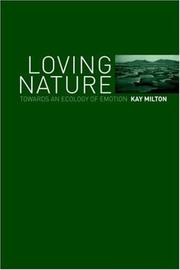| Listing 1 - 1 of 1 |
Sort by
|

ISBN: 0415253543 0415253535 1134525397 1280403187 0585459274 0203421418 9780203421413 9780585459271 9780415253536 9780415253543 9781280403187 9786610403189 661040318X 9781134525393 9781134525348 9781134525386 1134525389 Year: 2006 Publisher: London: Routledge,
Abstract | Keywords | Export | Availability | Bookmark
 Loading...
Loading...Choose an application
- Reference Manager
- EndNote
- RefWorks (Direct export to RefWorks)
As the full effects of human activity on Earth's life-support systems are revealed by science, the question of whether we can change, fundamentally, our relationship with nature becomes increasingly urgent. Just as important as an understanding of our environment, is an understanding of ourselves, of the kinds of beings we are and why we act as we do. In Loving Nature Kay Milton considers why some people in western societies grow up to be nature lovers, actively concerned about the welfare and future of plants, animals, ecosystems and nature in general, while others seem indifferent or intent on destroying these things. Drawing on findings and ideas from anthropology, psychology, cognitive science and philosophy, the author discusses how we come to understand nature as we do, and above all, how we develop emotional commitments to it. Anthropologists, in recent years, have tended to suggest that our understanding of the world is shaped solely by the culture in which we live. Controversially Kay Milton argues that it is shaped by direct experience in which emotion plays an essential role. The author argues that the conventional opposition between emotion and rationality in western culture is a myth. The effect of this myth has been to support a market economy which systematically destroys nature, and to exclude from public decision making the kinds of emotional attachments that support more environmentally sensative ways of living. A better understanding of ourselves, as fundamentally emotional beings, could give such ways of living the respect they need.
Environmental psychology. --- Nature --- Psychological aspects. --- Environmental psychology --- Psychological aspects --- Nature. --- Nature - Psychological aspects. --- Psychology --- Social Sciences --- Nature - Psychological aspects
| Listing 1 - 1 of 1 |
Sort by
|

 Search
Search Feedback
Feedback About UniCat
About UniCat  Help
Help News
News